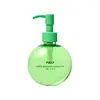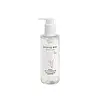What's inside
What's inside
 Key Ingredients
Key Ingredients

 Benefits
Benefits

 Concerns
Concerns

 Ingredients Side-by-side
Ingredients Side-by-side

Ethylhexyl Palmitate
EmollientSorbeth-30 Tetraoleate
EmulsifyingSorbitan Sesquioleate
EmulsifyingTriethylhexanoin
MaskingCaprylic/Capric Triglyceride
MaskingPolyisobutene
Cetyl Ethylhexanoate
EmollientDiisostearyl Malate
EmollientParfum
MaskingOlea Europaea Fruit Oil
MaskingSolanum Lycopersicum Seed Oil
EmollientMelia Azadirachta Leaf Extract
Skin ConditioningMelia Azadirachta Flower Extract
Skin ConditioningCoccinia Indica Fruit Extract
Skin ConditioningAmber Powder
Solanum Melongena Fruit Extract
Skin ConditioningCurcuma Longa Root Extract
MaskingOcimum Sanctum Leaf Extract
Skin ConditioningArgania Spinosa Kernel Oil
EmollientAvena Sativa Kernel Oil
Skin ConditioningCarthamus Tinctorius Seed Oil
MaskingCitrus Junos Fruit Oil
MaskingHelianthus Annuus Seed Oil
EmollientPersea Gratissima Oil
Skin ConditioningPunica Granatum Seed Oil
EmollientPyrus Malus Seed Oil
EmollientRubus Chamaemorus Seed Oil
Skin ConditioningSimmondsia Chinensis Seed Oil
EmollientVitis Vinifera Seed Oil
EmollientCorallina Officinalis Extract
Skin ConditioningMoringa Oleifera Seed Oil
EmollientSalicylic Acid
MaskingSolanum Lycopersicum Fruit Water
MaskingCamellia Japonica Seed Oil
EmollientLinum Usitatissimum Seed Oil
PerfumingButylene Glycol
Humectant1,2-Hexanediol
Skin ConditioningSolanum Lycopersicum Fruit Juice
Skin ConditioningHydroxyacetophenone
AntioxidantChamomilla Recutita Flower Oil
MaskingEthylhexyl Palmitate, Sorbeth-30 Tetraoleate, Sorbitan Sesquioleate, Triethylhexanoin, Caprylic/Capric Triglyceride, Polyisobutene, Cetyl Ethylhexanoate, Diisostearyl Malate, Parfum, Olea Europaea Fruit Oil, Solanum Lycopersicum Seed Oil, Melia Azadirachta Leaf Extract, Melia Azadirachta Flower Extract, Coccinia Indica Fruit Extract, Amber Powder, Solanum Melongena Fruit Extract, Curcuma Longa Root Extract, Ocimum Sanctum Leaf Extract, Argania Spinosa Kernel Oil, Avena Sativa Kernel Oil, Carthamus Tinctorius Seed Oil, Citrus Junos Fruit Oil, Helianthus Annuus Seed Oil, Persea Gratissima Oil, Punica Granatum Seed Oil, Pyrus Malus Seed Oil, Rubus Chamaemorus Seed Oil, Simmondsia Chinensis Seed Oil, Vitis Vinifera Seed Oil, Corallina Officinalis Extract, Moringa Oleifera Seed Oil, Salicylic Acid, Solanum Lycopersicum Fruit Water, Camellia Japonica Seed Oil, Linum Usitatissimum Seed Oil, Butylene Glycol, 1,2-Hexanediol, Solanum Lycopersicum Fruit Juice, Hydroxyacetophenone, Chamomilla Recutita Flower Oil
Ethylhexyl Palmitate
EmollientSorbeth-30 Tetraoleate
EmulsifyingTriethylhexanoin
MaskingCetyl Ethylhexanoate
EmollientIsopropyl Palmitate
EmollientDiisostearyl Malate
EmollientSorbitan Sesquioleate
EmulsifyingCaprylic/Capric Triglyceride
MaskingOryza Sativa Bran Oil
EmollientCapryloyl Salicylic Acid
ExfoliatingWater
Skin ConditioningGlycerin
HumectantCitrus Junos Fruit Oil
MaskingGlycine Max Oil
EmollientGlycine Soja Oil
EmollientPanax Ginseng Seed Oil
EmollientPolyglyceryl-10 Laurate
Skin Conditioning1,2-Hexanediol
Skin ConditioningGlutathione
Hydrogenated Lecithin
EmulsifyingKyounin Yu
Skin ConditioningCamellia Japonica Seed Oil
EmollientPrunus Persica Fruit Extract
AbrasiveEthylhexyl Palmitate, Sorbeth-30 Tetraoleate, Triethylhexanoin, Cetyl Ethylhexanoate, Isopropyl Palmitate, Diisostearyl Malate, Sorbitan Sesquioleate, Caprylic/Capric Triglyceride, Oryza Sativa Bran Oil, Capryloyl Salicylic Acid, Water, Glycerin, Citrus Junos Fruit Oil, Glycine Max Oil, Glycine Soja Oil, Panax Ginseng Seed Oil, Polyglyceryl-10 Laurate, 1,2-Hexanediol, Glutathione, Hydrogenated Lecithin, Kyounin Yu, Camellia Japonica Seed Oil, Prunus Persica Fruit Extract
Ingredients Explained
These ingredients are found in both products.
Ingredients higher up in an ingredient list are typically present in a larger amount.
1,2-Hexanediol is a synthetic liquid and another multi-functional powerhouse.
It is a:
- Humectant, drawing moisture into the skin
- Emollient, helping to soften skin
- Solvent, dispersing and stabilizing formulas
- Preservative booster, enhancing the antimicrobial activity of other preservatives
Camellia Japonica Seed Oil comes from the Japanese Camellia plant. This plant is native to East Asia and known as "Tsubaki" in Japanese.
Camellia Japonica Seed Oil is rich in oleic acid. This makes it a great emollient. Emollients help soften and soothe the skin by forming a barrier. This barrier traps moisture within, keeping your skin hydated.
This ingredient is an emollient, solvent, and texture enhancer. It is considered a skin-softener by helping the skin prevent moisture loss.
It helps thicken a product's formula and makes it easier to spread by dissolving clumping compounds.
Caprylic Triglyceride is made by combining glycerin with coconut oil, forming a clear liquid.
While there is an assumption Caprylic Triglyceride can clog pores due to it being derived from coconut oil, there is no research supporting this.
Learn more about Caprylic/Capric TriglycerideCetyl Ethylhexanoate is an emollient ester. It comes from cetearyl alcohol and 2-ethylhexanoic acid.
Cetyl Ethylhexanoate is an emollient that adds a velvety feel to skin without being greasy or oily. Emollients help trap moisture into your skin, keeping your skin soft and hydrated.
Citrus Junos Fruit Oil is a fragrance and is an oil.
Diisostearyl Malate is an emollient and most often used in lip products. It comes from isostearyl alcohol, a fatty acid, and malic acid, an AHA.
As an emollient, Diisostearyl Malate helps create a thin film on your skin to trap moisture in. This helps keep your skin soft and smooth.
Ethylhexyl Palmitate, also known as octyl palmitate, is created from 2-ethylhexyl alcohol and palmitic acid. It is a fatty acid ester.
The fatty acid content of Ethylhexyl Palmitate makes it an emollient. Emollients help soften and hydrate your skin by trapping moisture within.
Ethylhexyl Palmitate is also used to help improve the texture of cosmetics. It helps other ingredient dissolve in products and help disperse ingredients more evenly.
You'll likely find this ingredient in sunscreen, as it is often used to mix UV-blocking ingredients such as avobenzone and ethylhexyl triazone.
It can also help stabilize the fragrances in a product as a fragrance fixative.
Ethylhexyl Palmitate can be used to substitute mineral oil.
Due to its high fatty acid content, it may not be fungal-acne safe.
Learn more about Ethylhexyl PalmitateSorbeth-30 Tetraoleate is a surfactant and emulsifier.
This ingredient is a tetraester from oleic acid and polyethylene glycol ether of sorbitol.
As an emulsifier, it helps ingredients such as oil and water mix together. This allows the dirt and oils in your skin to be washed away.
One study found pumpkin oil containing Sorbeth-30 Tetraoleate helped hydrate the skin and did not cause any irritation.
Learn more about Sorbeth-30 TetraoleateSorbitan Sesquioleate is derived from sorbitol and oleic acid. It is an emulsifier and prevents ingredients from separating.
Specifically, this ingredient is a water-in-oil emulsifier, meaning it helps water dissolve into oil.
Some studies suggest this ingredient may cause irritation in some people. If you are unsure, it is best to patch test.
This ingredient may not be Malassezia folliculitis, or fungal-acne safe.
Learn more about Sorbitan SesquioleateTriethylhexanoin is created from glycerin and 2-ethylhexanoic acid. It is a solvent and emollient.
As a solvent, Triethylhexanoin helps dissolve ingredients to stable bases or help evenly distribute ingredients throughout the product.
It is also an emollient and helps condition the skin.
Learn more about Triethylhexanoin